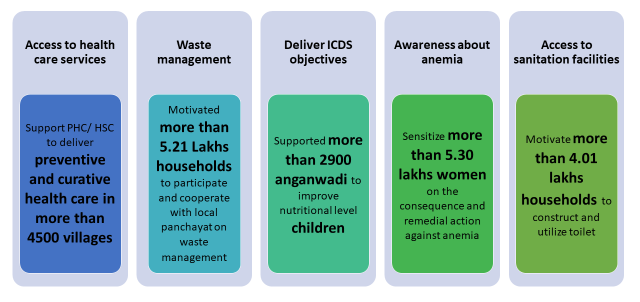While the overall state of healthcare in India has improved over the past 10 years, it still continues to be one of the key concern areas particularly for the rural population in the country. Access to quality healthcare is still a challenge and we are far away from fulfilling the WHO norm of having 1 doctor per 1000 people.
Srinivasan Services Trust (SST), the CSR arm of TVS Motor Company, works closely with communities in rural India to educate them on health issues in their vicinity and focus on preventive healthcare. SST Support primary health centres to organize health camps from time to time to encourage preventive healthcare and educate people on hygiene and sanitation to avoid communicable diseases.
These camps are held by respective PHC/ HSC in 5000 villages across 5 states and help spot common issues relating to rural health care. Supporting the hands by SST on health department programs aim to enable women and children towards Ante natal and post-natal care, reduce malnutrition and access the care they need. Awareness and facilitation initiated by SST include motivate community on building toilets, utilisation of government programs for potable drinking water and ensuring better nutrition.
 Swaran Singh, CEO, Srinivasan Services Trust said, “At SST, we continue to support the holistic growth and development of the rural community by facilitating government programs in project villages along with community. WHO is running a campaign #HealthForAll this year and SST is working closely with communities, government health departments and other like-minded organisations to bring this thought alive.”
Swaran Singh, CEO, Srinivasan Services Trust said, “At SST, we continue to support the holistic growth and development of the rural community by facilitating government programs in project villages along with community. WHO is running a campaign #HealthForAll this year and SST is working closely with communities, government health departments and other like-minded organisations to bring this thought alive.”
“We support government initiatives towards a multi-pronged approach to ensure overall wellbeing of the communities. We join hands with the health department to address common health issues with an integrated approach. We support PHC/ HSC/ VHN (Village Health Nurse) on immunisation, rendering ante natal and post-natal for lowering infant and maternal mortality rates, sensitise women about anaemia, awareness on personal hygiene and sanitation.”

